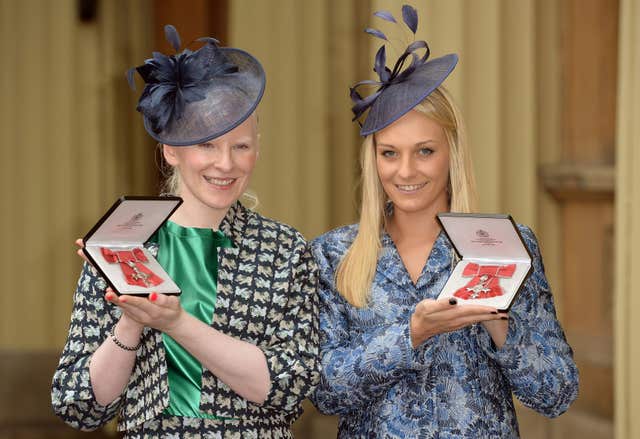
ParalympicsGB star Kelly Gallagher has arrived in Pyeongchang for her third Winter Games and has a simple message for the British public: Don’t tell me we’re not a winter sports nation.
The 32-year-old from Bangor became the first British skier to win a gold medal at either an Olympics or Paralympics when she won the Super-G event for the visually impaired at Sochi 2014.
Gallagher considered retiring after that achievement – Britain’s first gold medal in any sport at a Winter Paralympics – particularly when her sighted guide in Sochi, Charlotte Evans, retired from competition.
The gang’s all here. ⛷🏂🥌
ParalympicsGB ready for the Welcome Ceremony in the Village today. #BeFearless 🇬🇧 pic.twitter.com/2cHUhDeetd
— ParalympicsGB (@ParalympicsGB) March 7, 2018
But the maths graduate told Press Association Sport she recalculated because a “nagging feeling kept telling me I wasn’t done”.
Gallagher teamed up with new guide Gary Smith in 2016 only to then miss most of the 2017 season after a crash in training before the world championships that left her with a dislocated elbow and broken ribs.
“It’s been a bumpy road and I have had moments when I thought, ‘It’s OK, mate, you can do something else now’ but something kept me going. I’m really pleased it did,” she said.
Gallagher started skiing again last summer – an idea that sounds strange but encapsulates Britain’s relationship with winter sports: despite our recent weather, we are not really set up for them but seem to enjoy trying them.
Backed by elite funding agency UK Sport, Gallagher and Smith can train in places like Chile, Norway and Europe’s best indoor slope in Wittenburg, near Hamburg, but millions of Britons try skiing and snowboarding every year, either on holiday or at indoor centres or artificial slopes at home.

Despite this, UK Sport’s decision to double its support for Britain’s Olympic and Paralympic teams in Pyeongchang this winter has provoked a debate about funding elite athletes in sports many consider to be too expensive, middle-class and niche for most ordinary Britons.
But Gallagher, an engaging and passionate advocate of her sport, is having none of that.
“I get really annoyed about this talk that we’re not a winter sports nation,” she said.
“Tell that to all those people sitting on planes out to the Alps and everywhere else. I appreciate it’s not everybody’s favourite sport but you can’t tell me that there isn’t an appetite for it.
“The Winter Games are so special because they’re the only place you’re going to see people throwing themselves off mountains, sliding down tracks and generally doing mad things.
“And if you look at the history of winter sports, the Brits are all over it. We were strapping bits of wood on our feet and jumping on sledges years ago.
“OK, you’re not going to walk into a bar and find blokes watching skiing on the TV. We’re not Austria. But when the Olympics were on everybody was talking about what they’d just seen on the BBC.”
Gallagher is convinced many will be having the same conversations when the Winter Paralympics start on Friday.
ParalympicsGB have come back empty-handed from six of the 11 previous Winter Games but won six medals four years ago.
With £4million of exchequer and lottery cash behind them, they have been given a target of seven in South Korea but could win several more if the talented 17-strong squad performs to the maximum of its ability.


Comments: Our rules
We want our comments to be a lively and valuable part of our community - a place where readers can debate and engage with the most important local issues. The ability to comment on our stories is a privilege, not a right, however, and that privilege may be withdrawn if it is abused or misused.
Please report any comments that break our rules.
Read the rules here